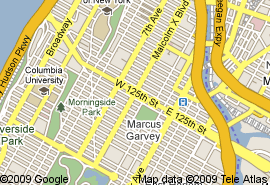
Many corporations and entrepreneurs today understand that patents are increasingly bought, sold and traded, just like many other assets. However, the patent monetization market is only just emerging and, as a result, few information sources exist today to assist patent owners in selling their patents. The nascent nature of the industry also means that most patent owners do not themselves possess the necessary expertise to successfully monetize their patents. Put simply, today, patent monetization is “easier said than done.”
In view of the challenges currently faced by patent owners seeking to generate revenue by monetizing their patents, I was intrigued to learn about the “IP Zone” to be established later in 2009 in the Harlem area of New York City. The IP Zone will be physically located at 125st Street and Lenox Avenue in the Upper Manhattan Empowerment Zone, which was established in the mid-1990’s to provide enhanced job and economic opportunities for the residents of this historically low income area of New York City.
I heard about the IP Zone from Tracey Thomas, who is currently Chief IP Strategist at American Express. As Mr. Thomas related the origins of the IP Zone project, under his supervision, American Express has generated a valuable patent portfolio in recent years. Now that it owns patents that could generate substantial revenue for the company, the goal now is to find the highest bidder for these assets. The question is how they can efficiently go about doing so. As related by Mr. Thomas: “Because only 10 % of patents suitable for sale are actually monetized, the market clearly needs to be more efficient.” It is this lack of efficiency that Mr. Thomas, American Express and the other sponsors of the IP Zone seek to address.
Prior to developing the concept of the IP Zone, American Express apparently realized that it would not make sense to hire one or more full-time employees to its patent portfolio because the company is not in the business of patent monetization. Mr. Thomas nonetheless understood that to obtain the highest value for the portfolio, American Express must understand the relevant markets for it patents, as well as be able to find the highest bidder for its rights. Mr. Thomas could certainly put the patents up for sale through a patent broker or at a patent auction, but these did not to be a suitable options for American Express–perhaps because the company is concerned that a “patent troll” may end up with its patents in the end or that the highest value could not be obtained using these existing vehicles for selling patents.
Without the necessary expertise available inside the company and with existing monetization sources apparently being unsuitable to it, American Express had effectively “hit a wall” in executing on its strategy to create a revenue stream from these patents. This is where the IP Zone value proposition arises–to, in Mr. Thomas’ words–“provide a new platform for IP transactions.”
As described by Mr. Thomas, the IP Zone will provide patent owners, both corporations and entrepreneurs alike, 5 work flow process steps deemed necessary for successful patent sales:
- Discovery: Determining what patent rights may be suitable for sale to third parties
- Cataloging: Itemization and presentation of patent rights for sale
- Engagement: Meeting and initial discussions between patent sellers and potential buyers
- Transaction: Conducting the actual sale, license or other disposition of the patents
- Post-transaction: Reporting and monitoring of royalties or other ongoing obligations
The IP Zone will be a place of association and collaboration for the following participants in this IP creation and patent monetization marketplace:
- IP Transactors: Those seeking to sell their patents (American Express and other companies to be named)
- IP Service Providers: IP lawyers, IP Strategists, patent brokers, patent analytics companies etc.
- Education Partners: law schools, business schools etc.
- Funded Incubators
- Residents of the Upper Manhattan Empowerment Zone
Mr. Thomas indicated that the IP Zone was expected to serve as a valuable resource for companies seeking to monetize their patent rights but which currently lack the expertise and experience today to do so. In other words, “the IP Zone will allow large companies to get up to speed quickly on commercialization of their IP.”
With regard to logistics, American Express donated the IP platform upon which the initial workflow processes in the IP Zone will be based. In my opinion, this is a very valuable aspect of the IP Zone because companies new to the patent monetization game can gain immediate competency by having access to a validated process by which to execute on their monetization goals.
American Express will not gain a fee from IP transactions occurring in the IP Zone. Rather, the company, as well as the other sponsors, will be participants in the IP marketplace that will exist under the auspices of the IP Zone. Mr. Thomas also indicates that the fact that the IP Zone exists as a government sponsored public-private partnership provides it with the imprimatur of a “neutral platform” for those seeking to enter into the patent monetization game, but who do not trust that the current mechanisms allow them the objectivity and privacy they see necessary to allow them to jump in full-throttle.
I am also a fan of the fact that the IP Zone will provide education and work opportunities for residents of the Harlem area of New York City. First, as anyone with experience in hiring and managing IP personnel will confirm, people with IP expertise generally earn higher salaries than others in the legal profession due to the highly specialized nature of IP practice. Thus, residents of Harlem who are hired into the IP Zone and trained in IP-specific tasks will obtain valuable skills that will serve both them and their community for the long-term. In addtion, the IP Zone will serve as a needed resource to improve the number of qualified IP specialists available for hiring at law firms and corporations.
A further benefit I see of the IP Zone for residents of the Upper Manhattan Empowerment Zone is to provide mentoring and information that will increase the number of IP lawyers and practitioners. That is, because IP attorneys are scientists first, then lawyers, the field of IP law tends to be heavily skewed against minorities, as well as women. I see the IP Zone to serve as a critical source of information and mentoring that will potentially increase the diversity of the IP profession in the future.
Mr. Thomas indicated that more information about the IP Zone would be forthcoming in April 2009. I will provide readers of the the IP Asset Maximizer with additional information about the IP Zone when it becomes available.



Jackie, wanted to give you some more updates on the IP Zone:
http://www.ipwire.com/ip-deals-and-opinion/american-express-launches-intellectual-property-zone.html
Along with a soft launch event:
http://www.regonline.com/builder/site/Default.aspx?EventID=971772